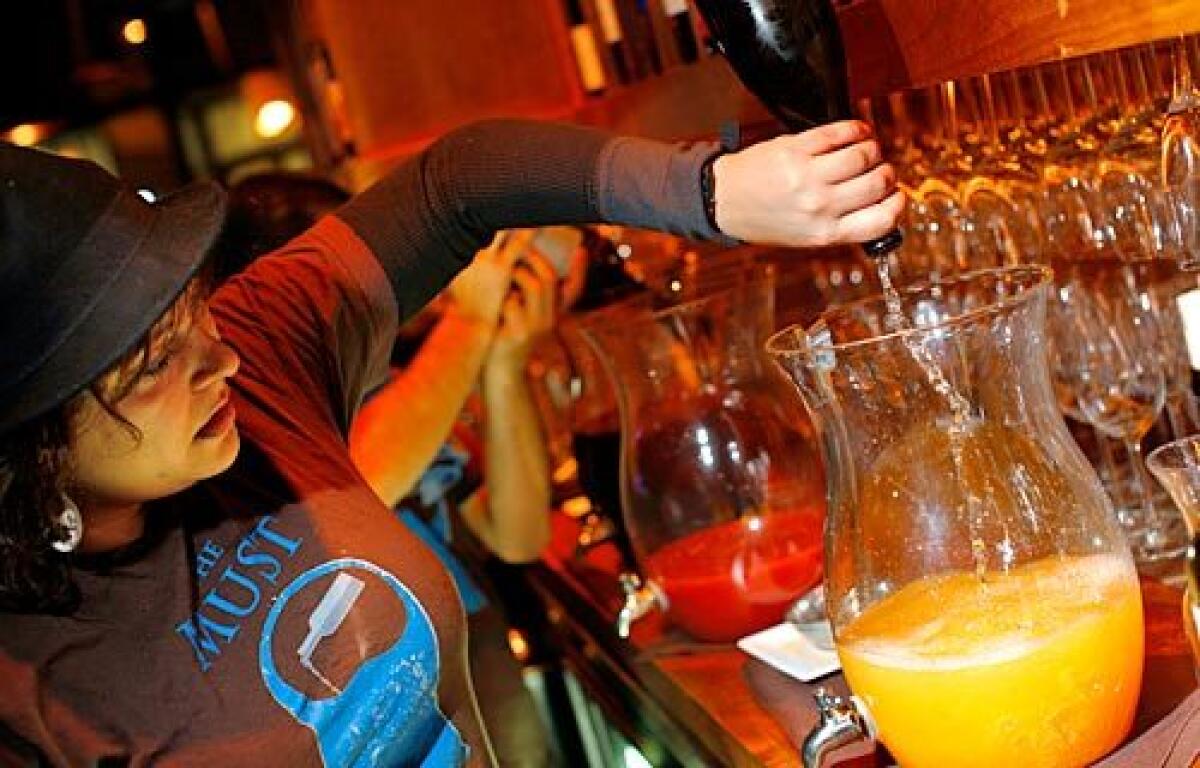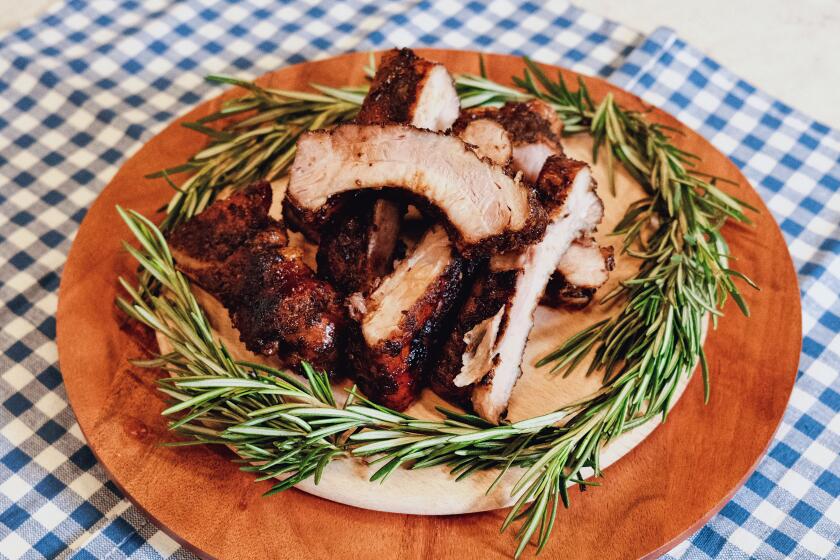Eater LA’s Must uproar puts blogger ethics in spotlight

- Share via
They say all press is good press, but when restaurateurs Rachel Thomas and Coly Den Haan read a nasty blind item about their downtown Los Angeles wine bar the Must on local food blog Eater LA, they were furious.
“I was flabbergasted,” Den Haan says. “I wanted to pass out. I didn’t know what to do. I think freaking out is a pretty good word to describe it.”
FOR THE RECORD:
Blogger ethics: A July 8 story on the controversy over blogger ethics identified Steven Shaw as the owner of the website EGullet. The website is now a registered nonprofit and Shaw is the executive director. —
The item, which ran last Tuesday, consisted of an anonymous tip accusing the Must of violating health codes and of substituting inferior cheeses and vegetables for the items listed on their menu.
Shortly after reading it, Thomas and Den Haan asked Eater LA to remove the post. The site declined but offered the women a chance to run an unedited statement of their own.
While Thomas and Den Haan weighed their legal options, the rough-hewn justice of the blogosphere took over. In the comments section on the original post, more than 100 comments, almost all of them negative, lambasted Eater LA and its editor Kat Odell for running the tip in the first place and for making no attempt to verify the tipster’s accusations.
Two days later, Eater LA ran a statement from Thomas and Den Haan and issued an online apology that read in part, “We apologize to the owners of the restaurant, and our readers, for not investigating our source’s claims before airing them on the site. The resulting post didn’t rise to our standards, and we shouldn’t have published it.”
To an outsider it may seem a minor brouhaha, but the online dust-up between the Must and Eater LA highlights the larger ethical quandaries that blogs face. Nowhere is this clearer or more intense than in the restaurant business, which (aside from chain eateries) is driven far more by word of mouth than by ad dollars.
Review sites like Yelp, discussion forums like Chowhound and hundreds of thousands of individual food blogs have irrevocably broadened the landscape of food reporting. That savvy restaurateurs and their PR agents try to curry their favor is a testament to these food bloggers’ power.
But, as the truism goes, with great power comes great responsibility. If the Internet has helped democratize discussion and critique, requiring traditional print publications to be more transparent and responsive, then bloggers who comment on or work in opposition to the mainstream media have become its de facto watchmen. What, if any, standards should food bloggers be held to?
Code of ethics
Like Martin Luther nailing his 95 Theses to a church in Wittenberg -- itself a disputed bit of reporting -- in April two Los Angeles bloggers posted a suggested Food Blogger Code of Ethics.
Their five-point manifesto addresses general concerns such as photo attribution, linkage, fact-checking, plagiarism and conflicts of interest, as well as more industry-specific concerns like accepting free meals and attending press tastings.
Brooke Burton (Food Wolf) and Leah Greenstein (Spicy Salty Sweet) have no illusions that they’ll incite a blogospheric reformation. With a foot in both camps -- Burton is currently a server at Tavern and writes copy for La Brea Bakery while Greenstein was formerly the general manager of Pizzeria Mozza and works for K&L Wine Merchants -- they hope the voluntary code of conduct will at least spark public discussion.
EGullet owner Steven Shaw earned plenty of buzz when he followed Burton and Greenstein by posting his own 12-point eG Ethics Code. Since then, it has acquired fewer than two dozen signatories. The response to the Food Blogger Code of Ethics has also been mixed.
“So many people responded by saying, ‘I’m not a journalist, this doesn’t apply to me,’ ” Burton says.
“If you say you are writing for yourself, why are you pressing “publish” so that potentially every person in the world can see what you’ve written?” Greenstein adds. “There comes some responsibility with the things you say, and I think what’s gone on with Eater LA in the past few days is a good indication of that.”
Reader tips
Lockhart Steele, co-founder and president of the Curbed network of sites, which includes Curbed, Eater and Racked, acknowledged the site’s mistake but staunchly defends the use of anonymous sources. (Eater LA editor Odell declined to be interviewed but said via e-mail, “What we post on our blog speaks for itself.”)
“Eater LA gets 100 to 200 reader tips per week,” Steele says. “Features like Star Watch are completely reader-produced. I think reader tips about restaurant openings and closings are one of the most powerful things that blogs have done to change the game. I would argue that sites like Eater LA would not exist without reader tips.”
But not all anonymous tips are created equal. Gossip about a restaurant opening or a menu or chef change is usually far less serious and less damaging than claims about a restaurant’s sanitation or food standards. Pat Saperstein, a senior editor at Variety and founder of the award-winning local food blog Eating L.A., says she once received a tip from someone whose friend had supposedly found a whole bird in a salad.
“I have gotten e-mails [with anonymous tips] and I haven’t even considered posting them,” she says. “What would be the point? I wouldn’t say you should never run an anonymous tip, but for any serious issue, you have a responsibility to contact the restaurant.”
Among the thorniest food-specific issues is the one surrounding press dinners and “comped” meals. Unlike most major newspaper critics who are required to eat at a restaurant multiple times and have the corporate backing to pay for it, food bloggers usually eat on their own dime. It can be an expensive hobby. Free press tastings give them invaluable access to restaurants they might not otherwise be willing to spend money on.
“It would be unrealistic for [blogs] to adhere to the exact same standards that restaurant reviewers at newspapers adhere to,” Saperstein says. “But [bloggers] should have some standards, and they should post these standards prominently and stick to them. I personally am not going to be very interested in reading a blog that’s all about people’s comped meals.”
She states on the right sidebar of Eating L.A.: “I pay for all the meals I review unless the post clearly states that I was invited or comped.” But without such transparency on the part of food bloggers, how would readers know?
Even if food bloggers could agree on a code of standards, who’s going to hold them to it? Business Week reports that the Federal Trade Commission may try.
This summer the FTC is expected to issue new guidelines that would require blog authors to “disclose when they’re being compensated by an advertiser to discuss a product.” Whether or not the FTC successfully legislates conflict-of-interest rules for the blogosphere, the legitimacy of most food blogs rests on their reputation.
“Right now blogs are sort of in a Wild West. Anyone can do what they want. There are no laws or rules,” Burton says. “People don’t have to follow our guidelines, but they have to realize that there are consequences to citizen journalism.”
More to Read
Eat your way across L.A.
Get our weekly Tasting Notes newsletter for reviews, news and more.
You may occasionally receive promotional content from the Los Angeles Times.







